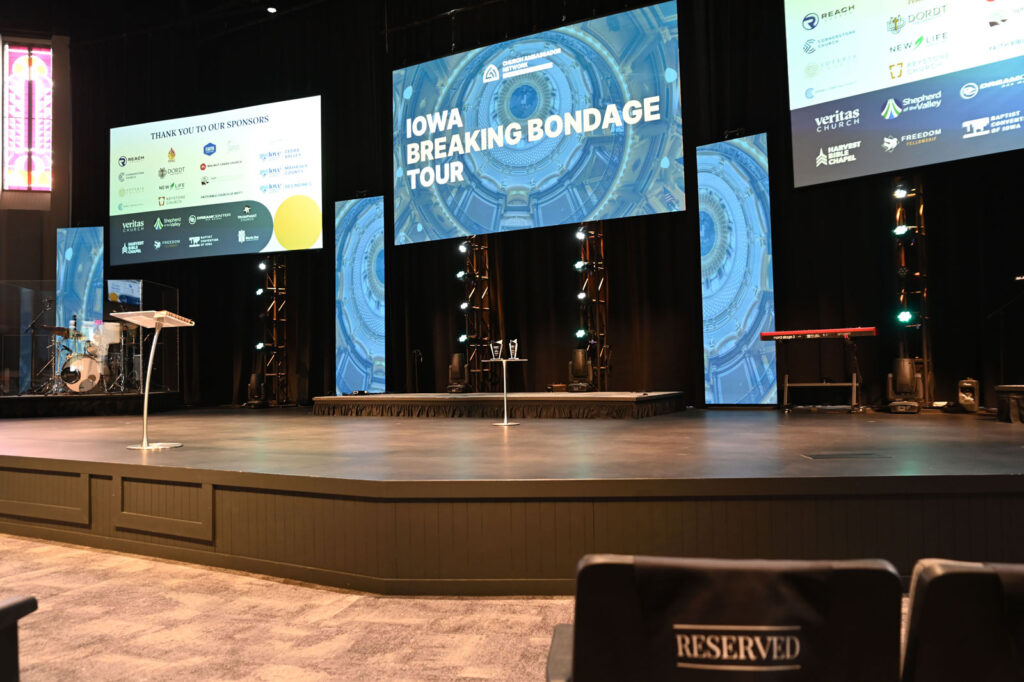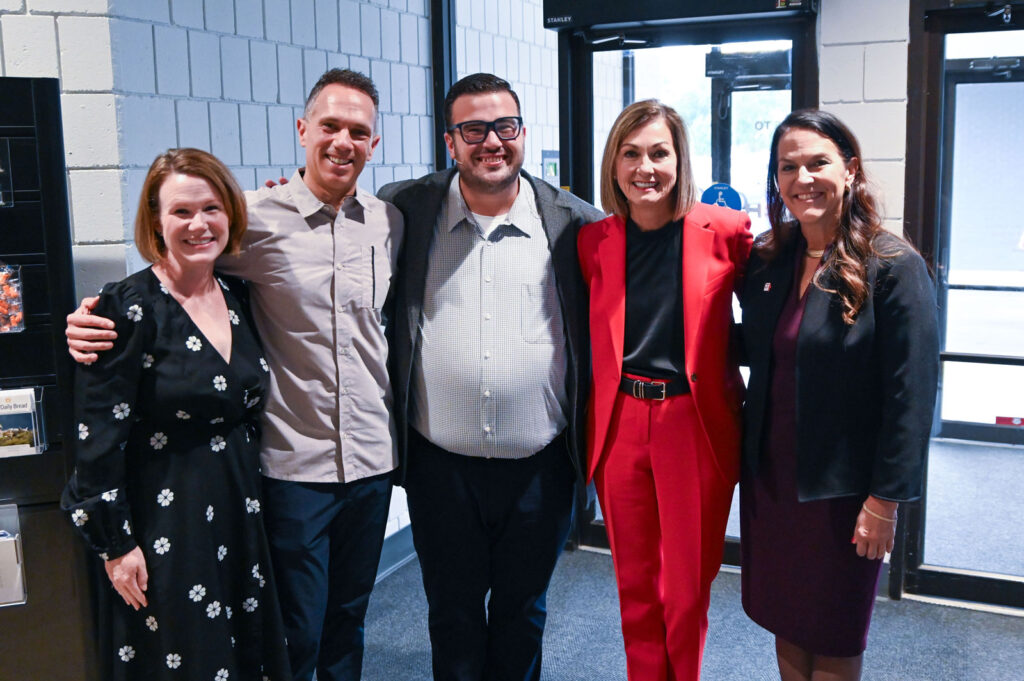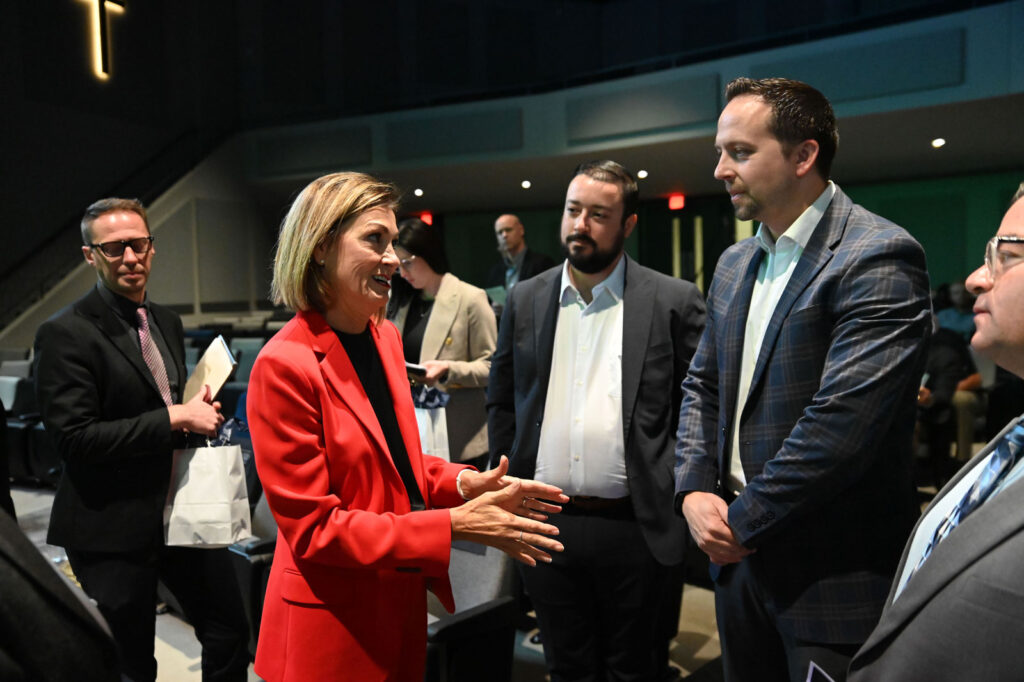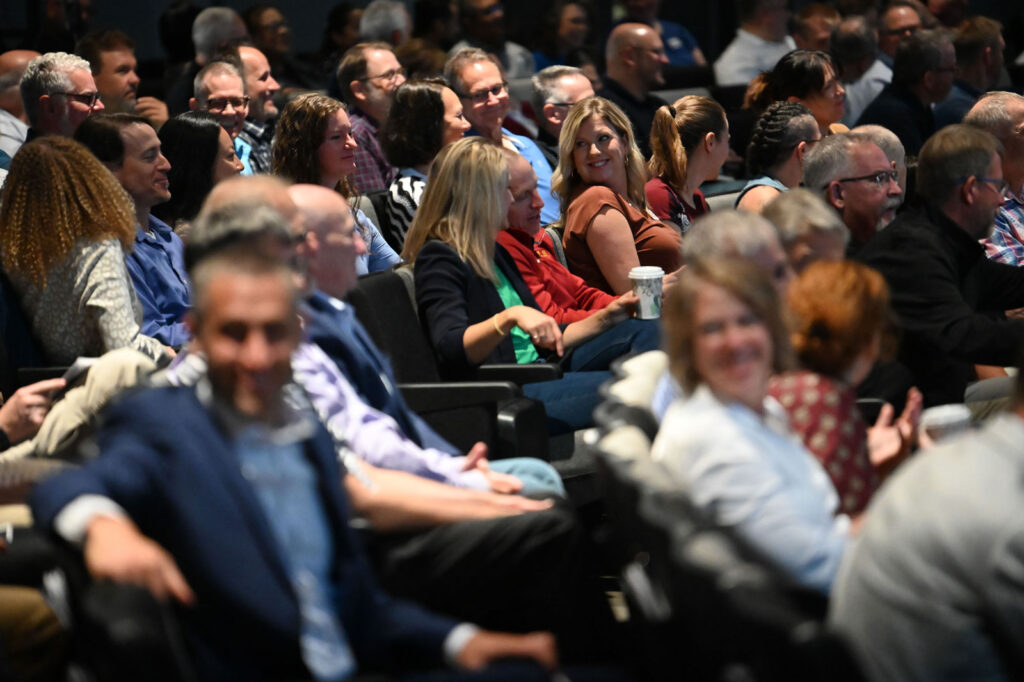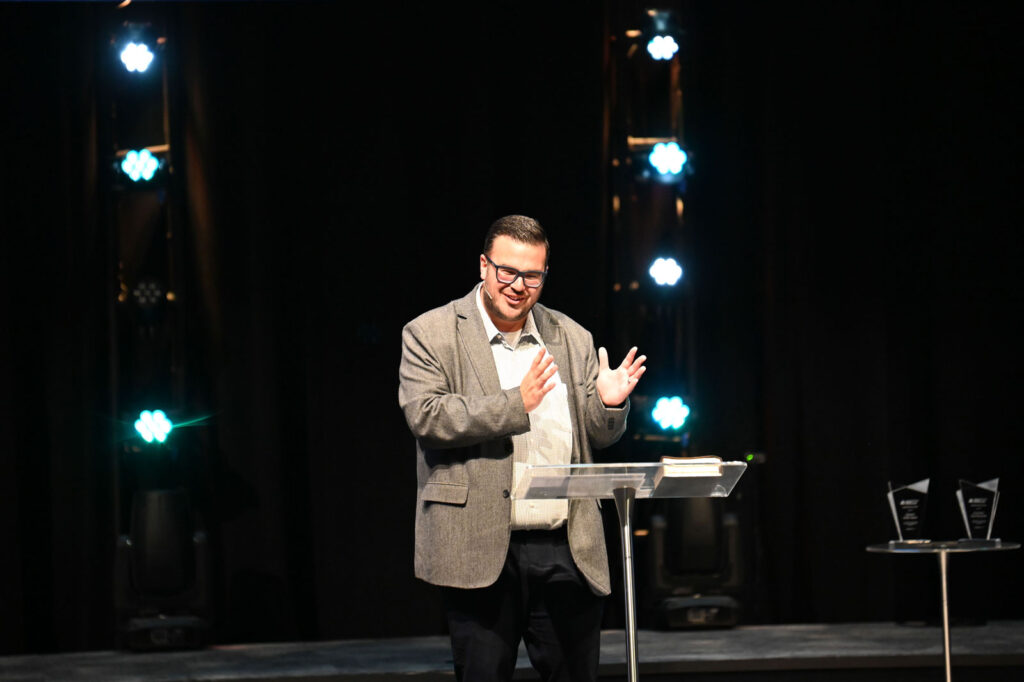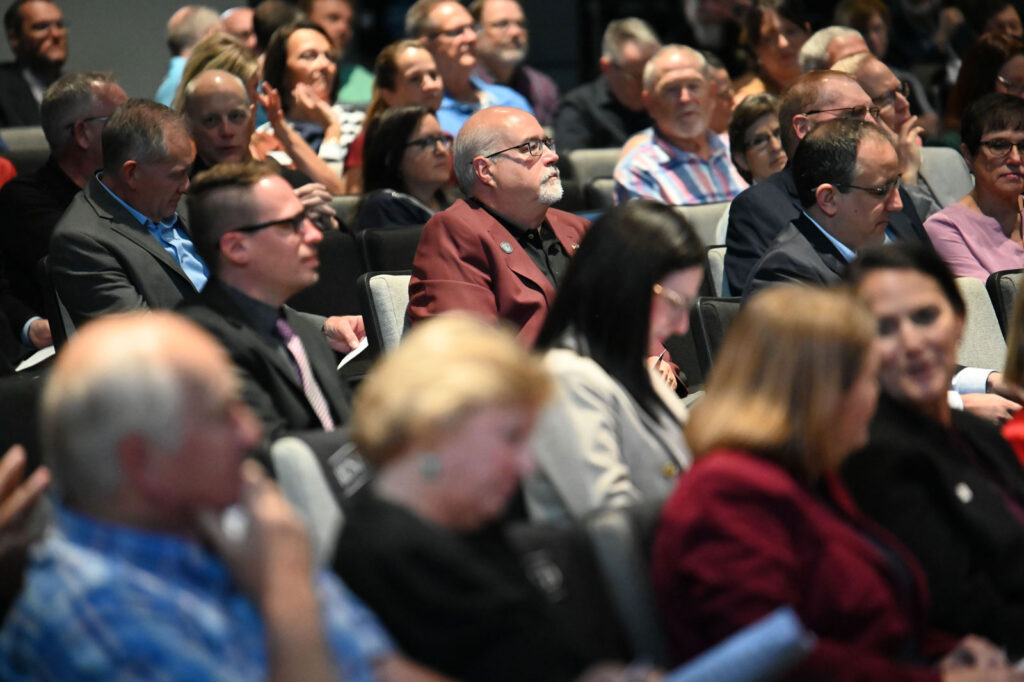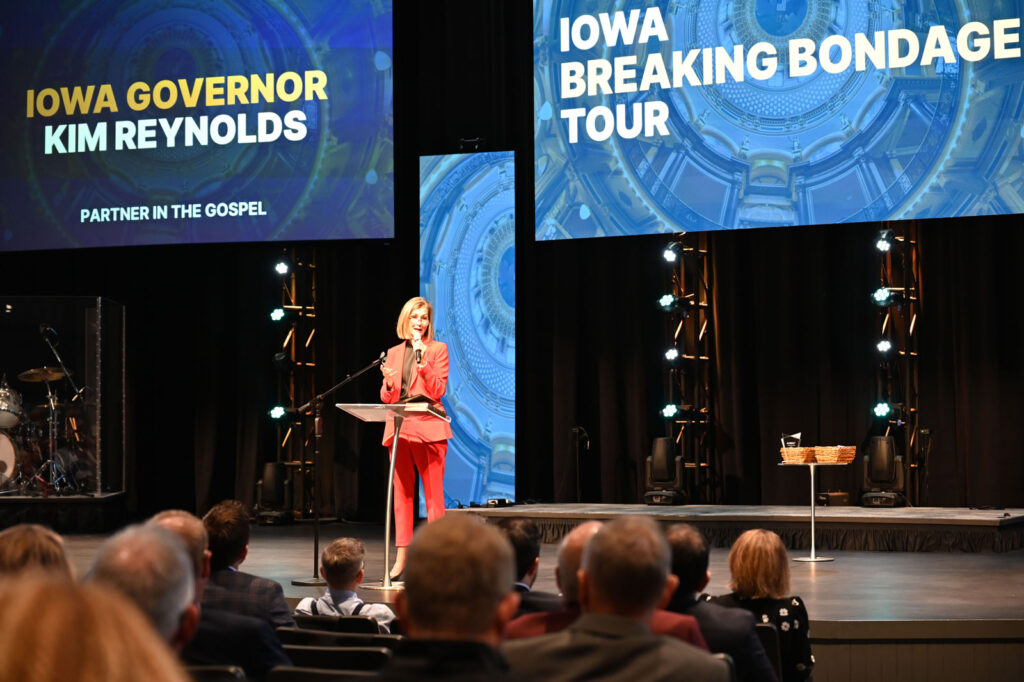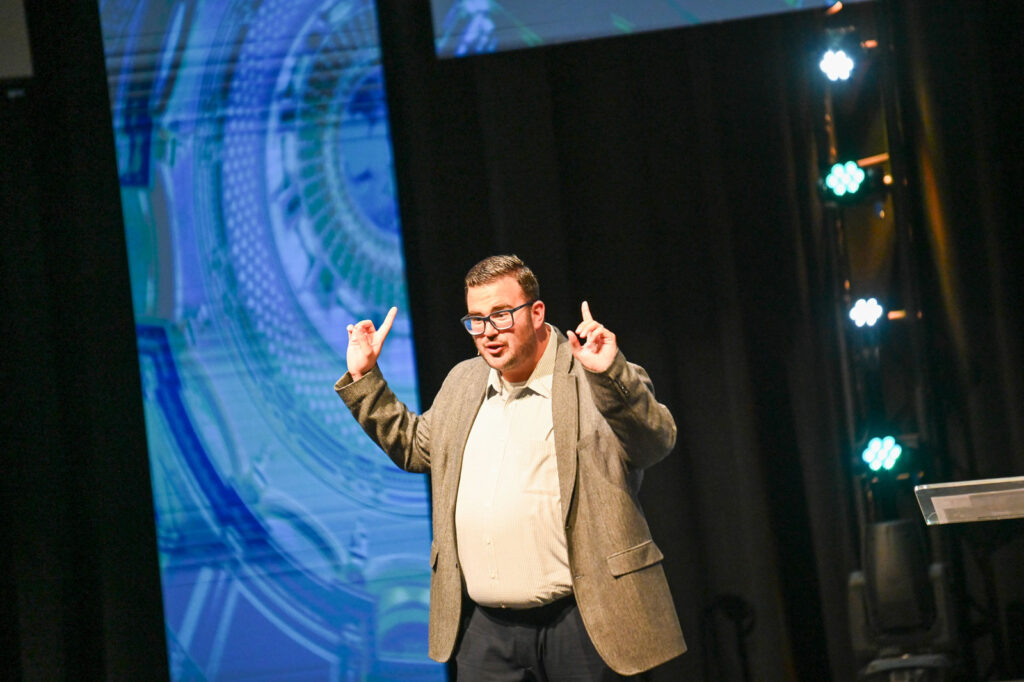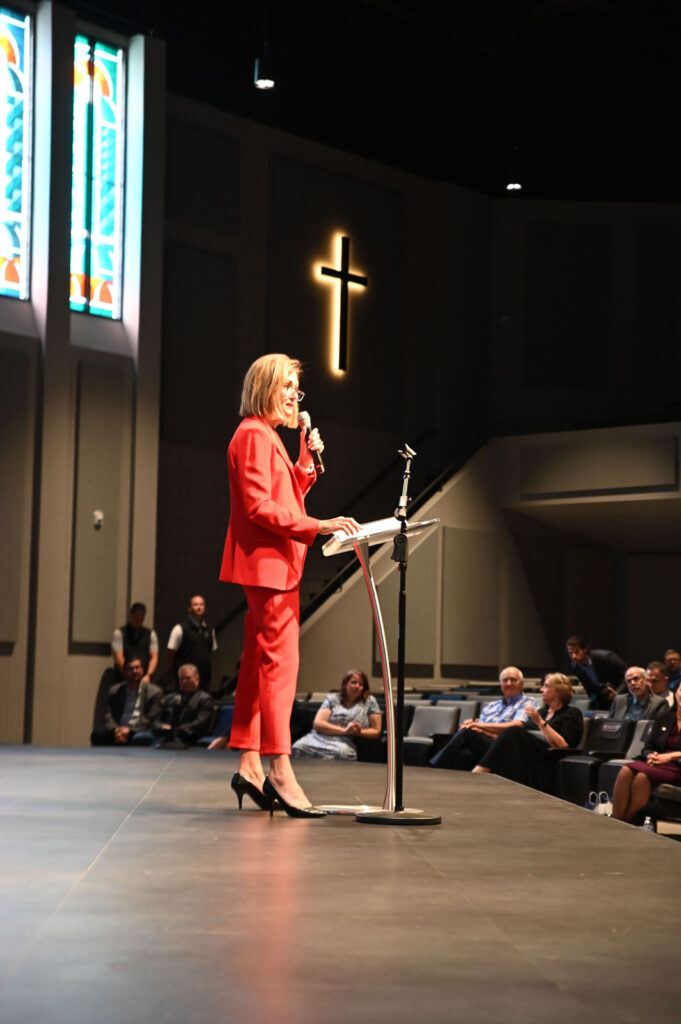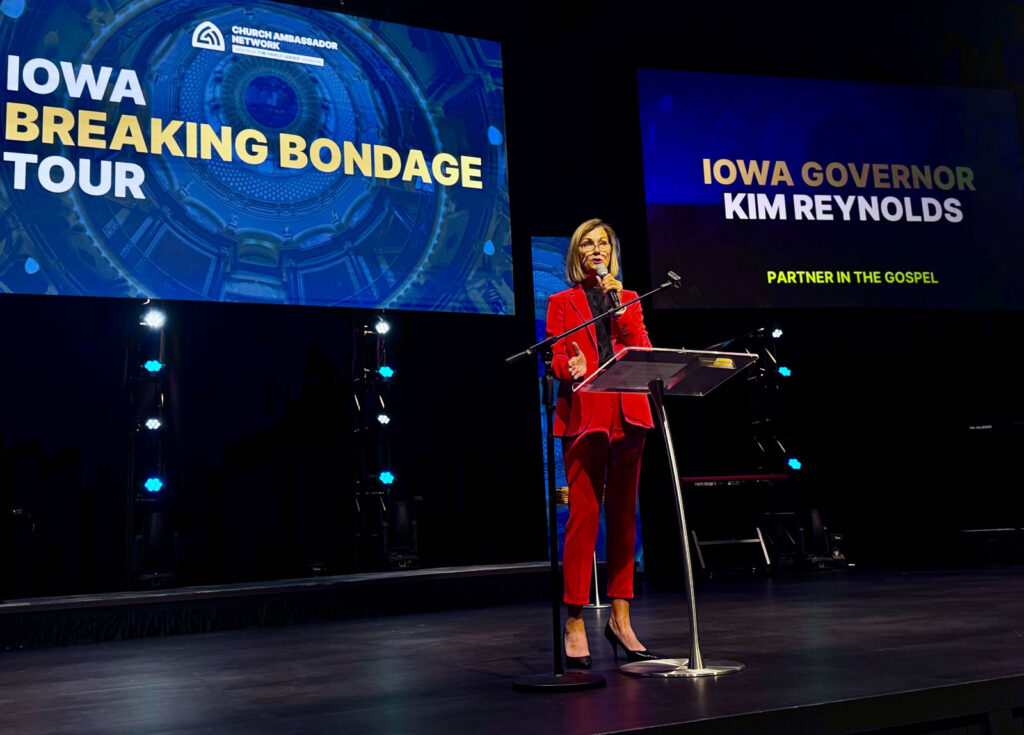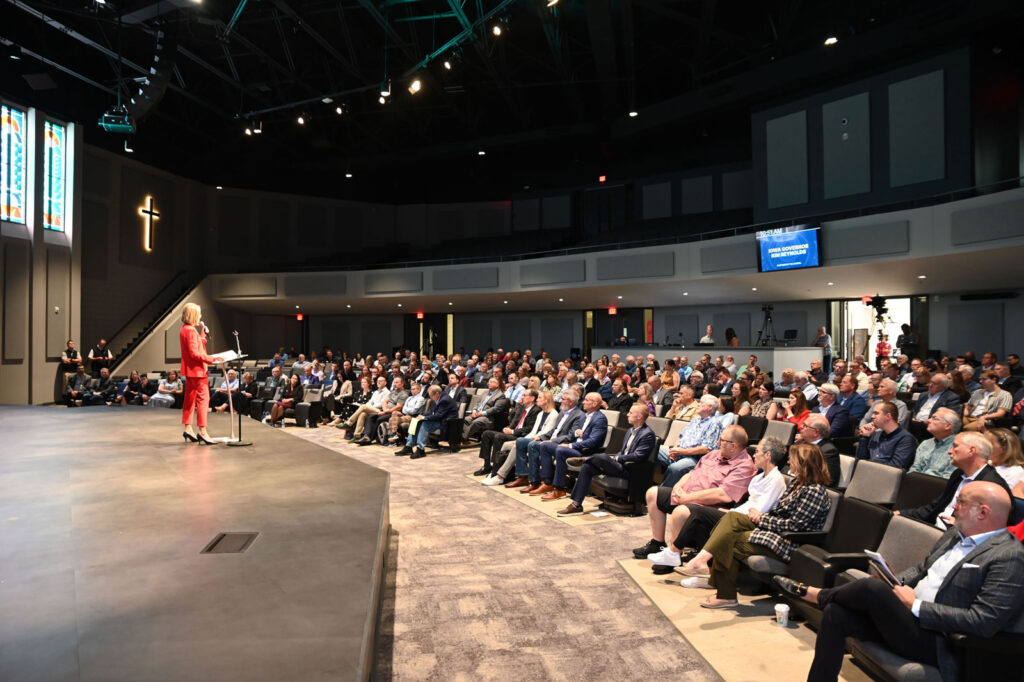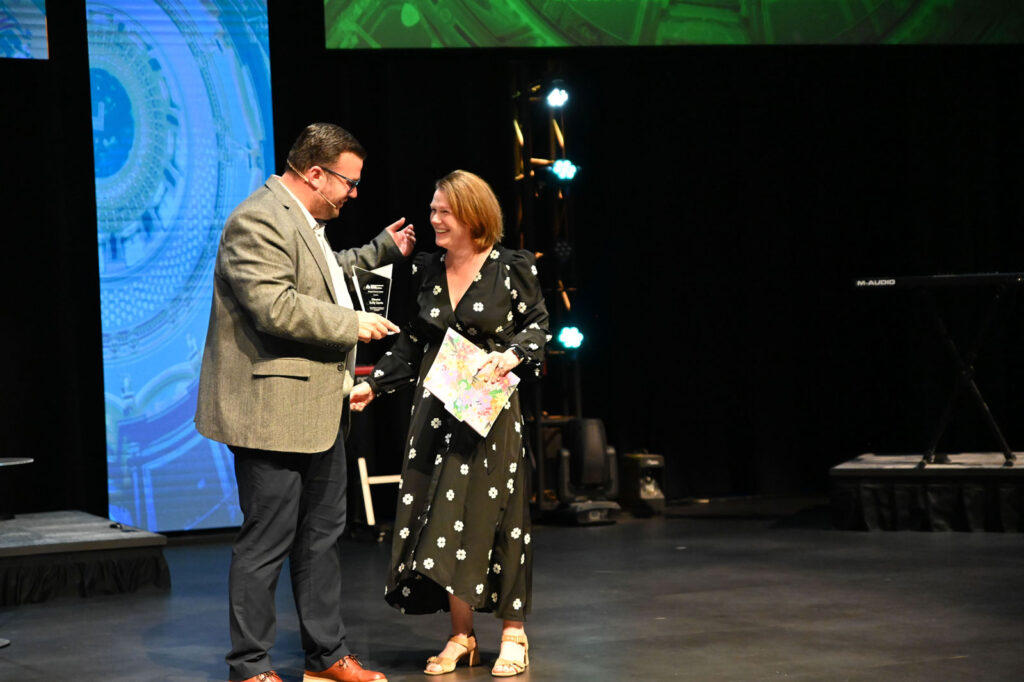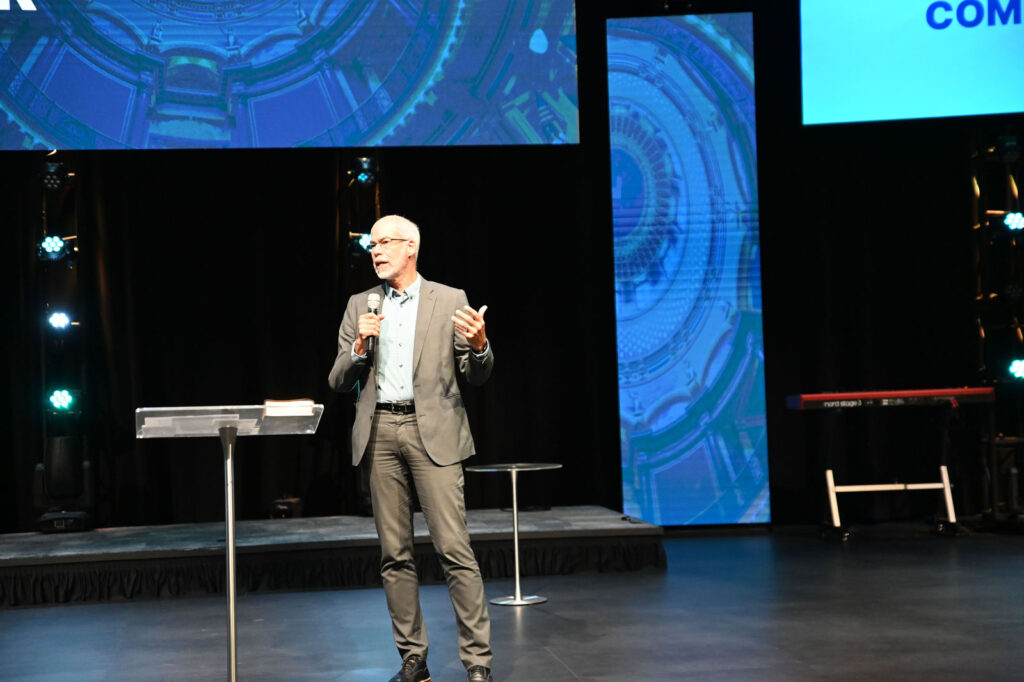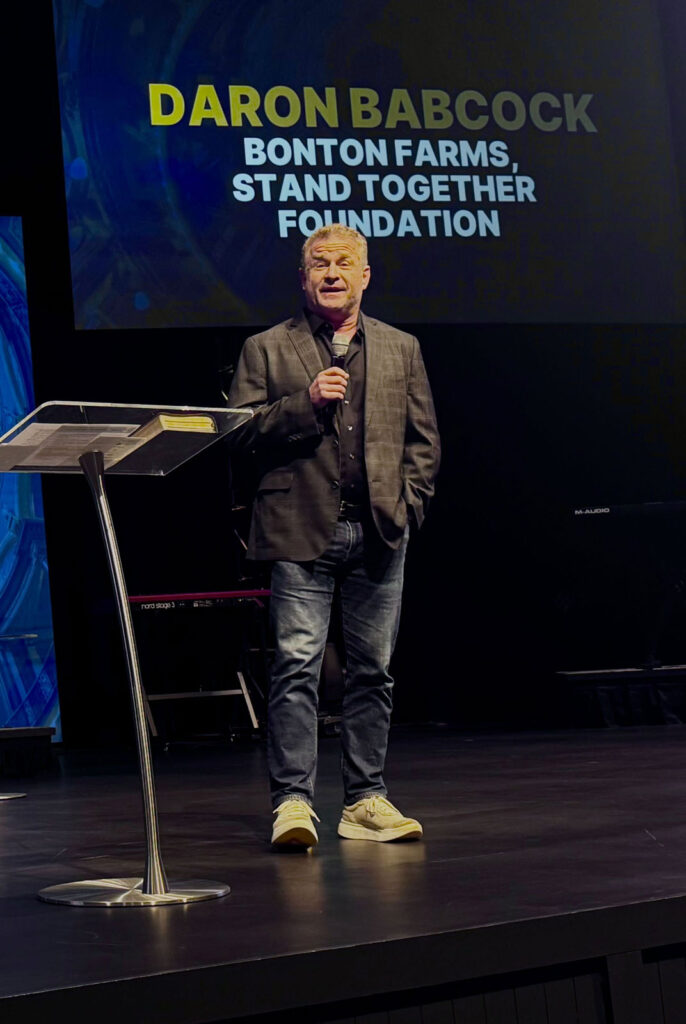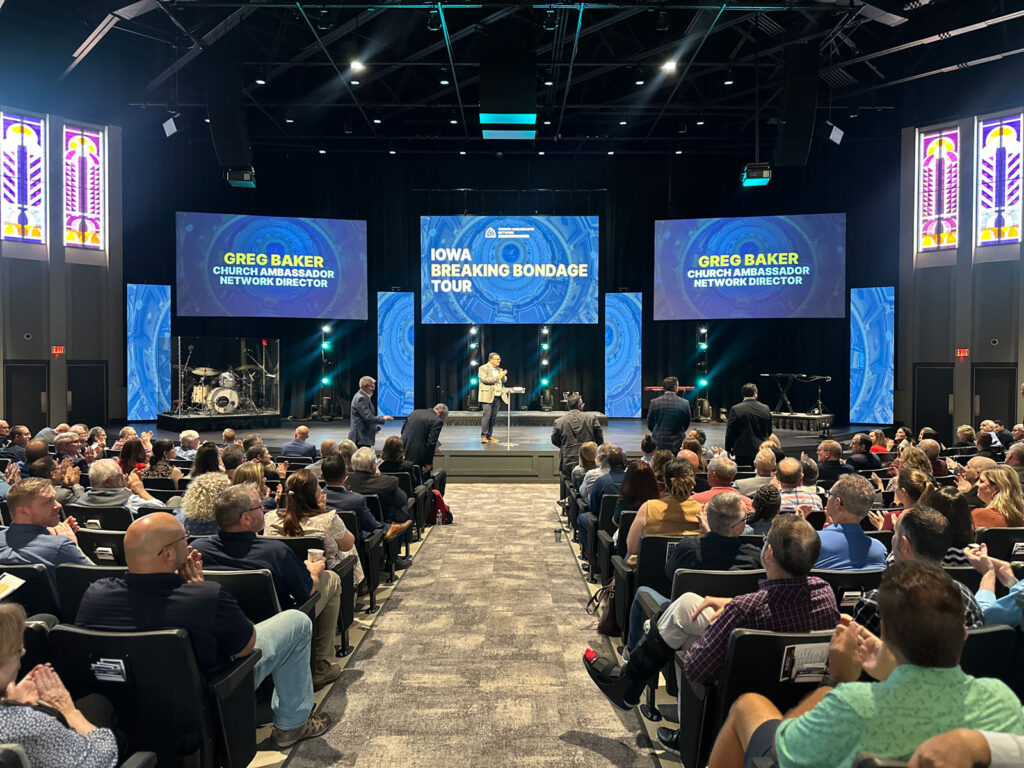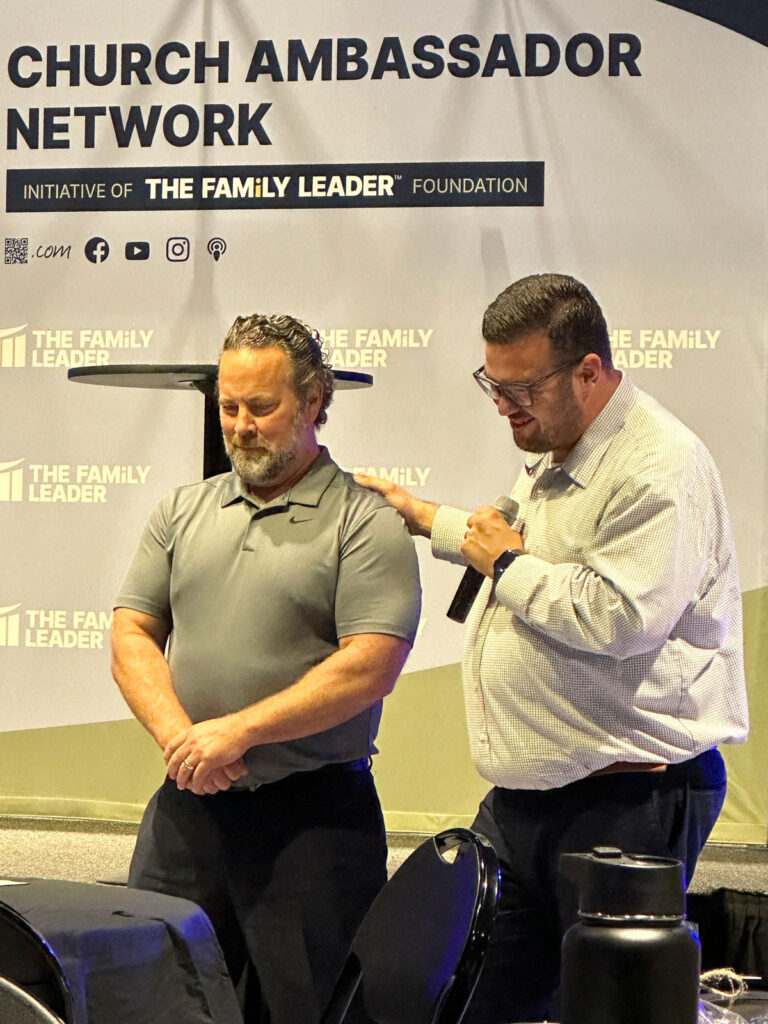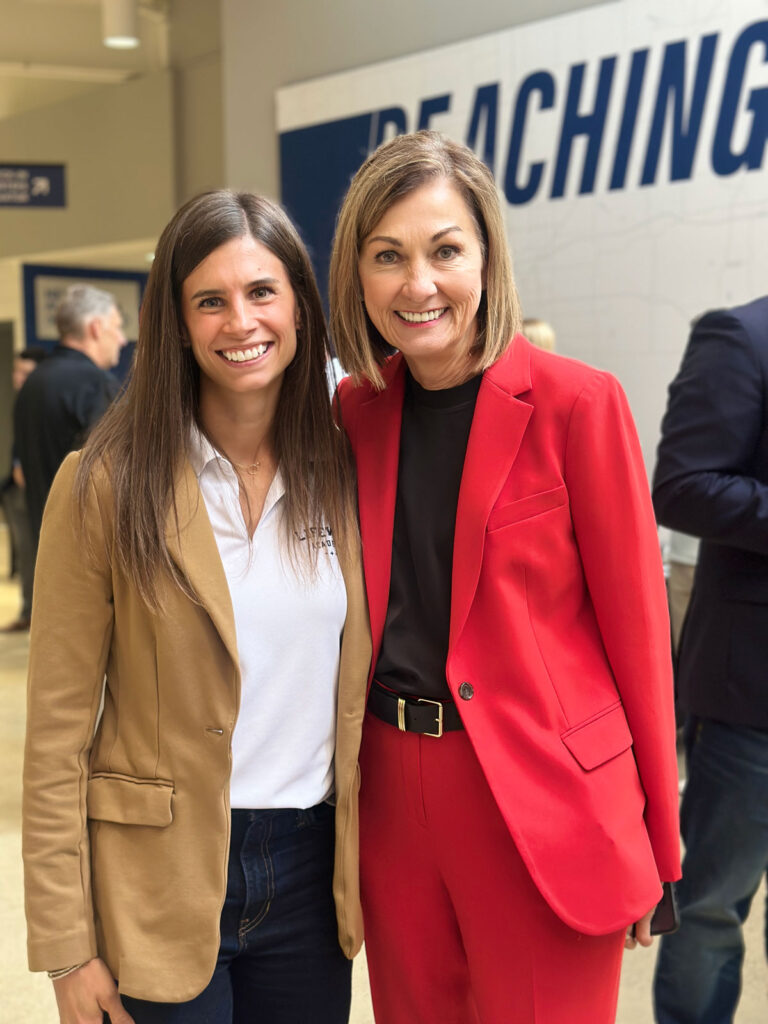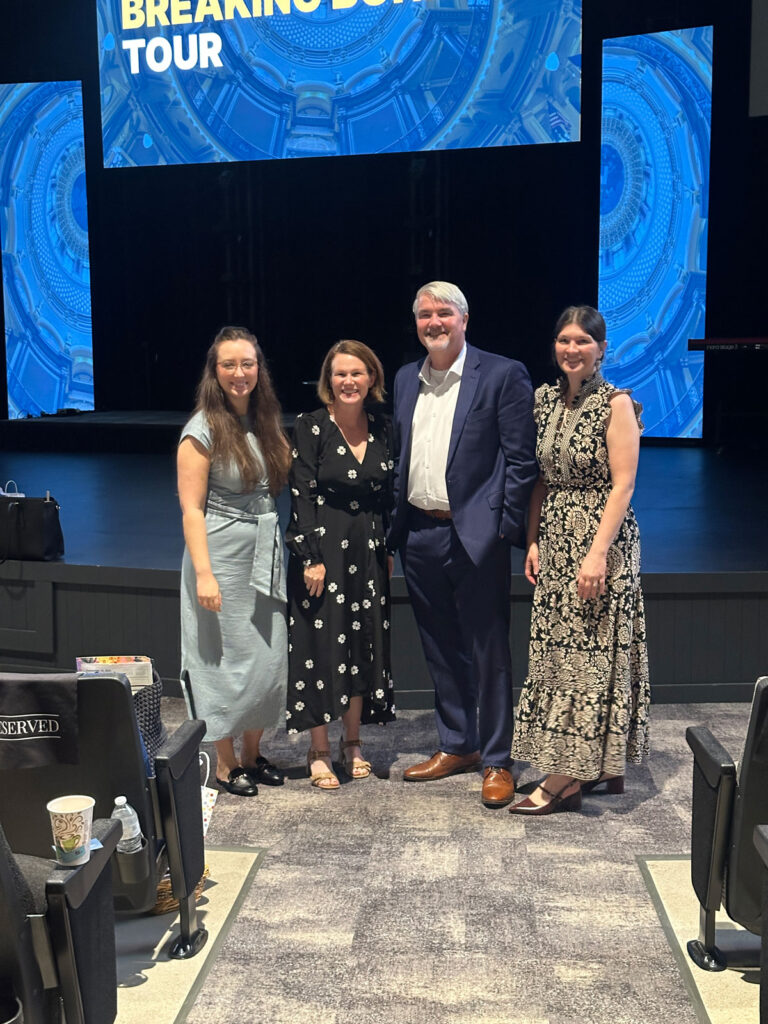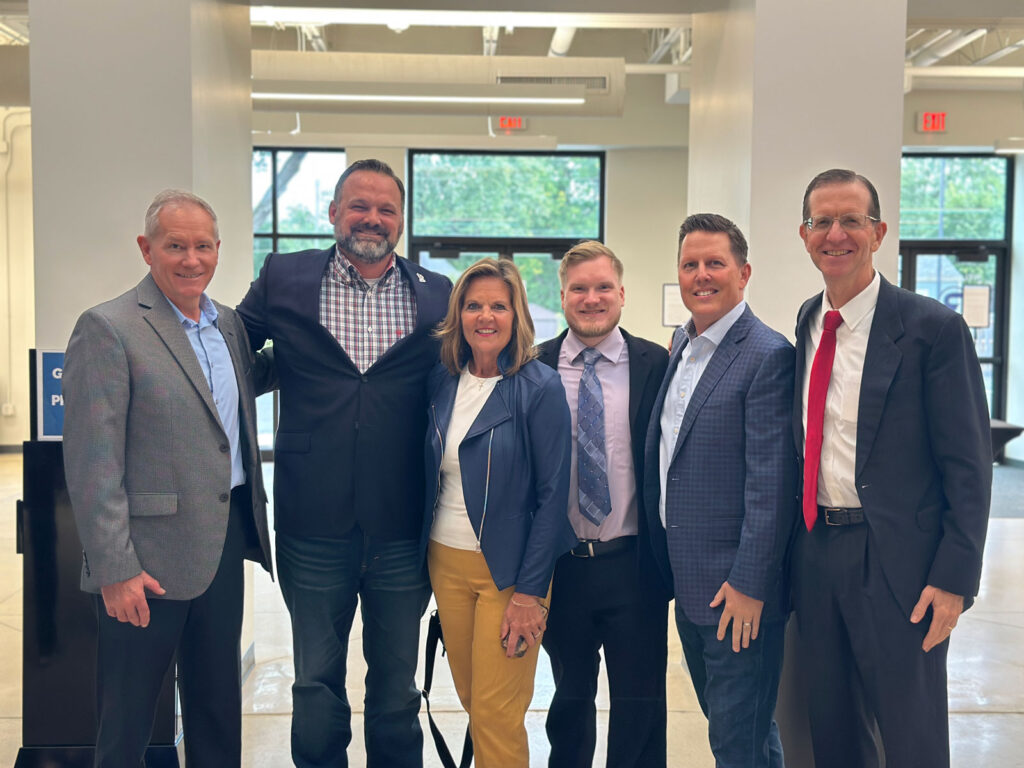
IOWA
BREAKING BONDAGE
TOUR
The Church Ambassador Network’s “Iowa Breaking Bondage Tour” last week honored Gov. Kim Reynolds and Iowa Department of Human Services Director Kelly Garcia for their roles in Iowa church-state partnership – which have been described as a modern-day example of the story of Pharoah and Joseph.
In opening the event, Pastor Cullen Allen noted that Reach Church, which hosted the event, had considered moving from Des Moines to a 60-acre site that it owned in the suburbs. Despite having blueprints ready, the congregation began to ask what God’s plan for the church was and decided it was to be in the city of Des Moines for the city of Des Moines.
After selling the suburban property, Reach Church invested the money in its Des Moines campus on Merle Hay Road and created a separate nonprofit organization, Dream Center Dest Moines, in 2024 to serve surrounding neighborhoods and build closer ties between them and the faith community.
CAN operates under the foundational understanding that without vision, communities suffer, and that the vision our communities need can only come from God, through churches like Reach that sow a biblical vision for their communities and their government leaders.
Greg Baker, Founding director of the Church Ambassador Network, noted that Reach church had been a legacy church and asked the audience to think about what message would have been sent to the community had it moved to the suburbs and left the neighborhood. “When business leaves the community. It sends one message. When the church leaves the community, it sends a way different message,” he said. “Instead, today … you see a church that is not only here but thriving and investing back into the community. … This is what’s so needed in America today and it is what the breaking bondage tour is all about.”
Baker continued the network was formed to communicate two things to government leaders. This first is that CAN wants all government leaders – elected, appointed, or hired– to see who they are called to be in Christ. The second is that officials should recognize churches as the primary resource for the many needs facing their communities, such as addiction, homelessness, mental illness, exploitation and other societal issues that cause families to break down and land children in state care.
“Not a resource. The primary resource,” he said. “The Bible teaches clearly that people are physical and spiritual. We can’t deny it. Government was never designed by God to deal with the spiritual.”
CAN pastors have ministered to 90% of the Democrats and 94% of the Republicans in the Iowa legislature. “Our God is a God of all people, and he’s calling all people. If God could work through people like Nebuchadnezzar in the Scriptures, he can work through you and me. That’s the faith we have here.”
Baker didn’t know if the effort was going to be a “one-week-and-done thing or not,” at the Capitol but 11 years later, the Church Ambassador Network has facilitated 10,500 connections between pastors and state government leaders that have laid a foundation for church-state partnership. Those efforts have now spread to 20 additional states.
Noting that the early church upended Rome through biblical teaching and service, Baker told audience members that God is not calling on them to “gather up our swords and go to war.” Instead, he said, the calling is to “proclaim truth, to combat the Devil’s lies that have taken people captive and to lead on our lives for one another.”
The network’s first meeting with Reynolds took place when she was still the lieutenant governor and she shared her personal testimony with a room packed with 75 pastors. The Network learned a lot since that first meeting and has perfected their meetings with government leaders while staying connected to Reynolds through her time as Lt. Governor.
During her first month as governor, two children died while in the state’s foster care system. Baker recalled how 10 pastors were meeting with Reynolds that day and prayed with her. The CAN team and pastors returned three months later, sharing the belief that churches needed to do more than pray for state officials; this was the beginning of CAN’s efforts to build church-state partnerships, including working with families to meet their needs and preventing children from entering the foster care system and coming alongside Director Garcia and Iowa HHS as they implemented the Family First Act and other critical reforms.
Through the hard work of Iowa HHS and its community partners like the Church Ambassador Network, Iowa’s foster care rate has fallen by 50 percent.
“A church and state partnership understands that both have a critical role to play,” Baker said. “This state leadership knows that it was not designed to deal with the spiritual… It has to come through the church.”
Speaking in a video because he was traveling, FAMiLY Leader President and CEO Bob Vander Plaats described Reynolds and Garcia as leaders who know that “writing a check is not the answer, that the government cannot bring solutions to all life’s problems and that it wasn’t designed to.”
Vander Plaats said Reynolds and Garcia have been raised up by God for such a time as this to see the church as a resource. That vision has enabled them to build partnerships with the church and state to help break bondage and set people free.
In thanking the two state leaders for their bold, servant-hearted leadership, he praised them for protecting, standing by and authentically engaging with the church and stewarding their offices in the fear of God.
Reynolds and Garcia each received the first-ever Church Ambassador Network Gospel Partner Award with the governor saying the recognition was especially cherished because it was presented by Baker. She noted that secular culture sees familial problems and social dysfunction as “merely material” and “bigger government is always the answer.”
Government does have a role to play, and she takes that role very seriously, Reynolds said. But, she added, “Government alone simply can’t heal the human heart, and that’s why this partnership truly matters, because we in this room, we know that bondage is fundamentally spiritual and that no wholeness is possible without God. This is why I’m so proud to say this … our state is different, because in Iowa, our churches, we’re not sitting on the sidelines. Instead, they’re preaching God’s Word in the halls of government, and the government is responding with partnership.”
Speaking to out-of-state audience members, she added, “We want to see you take this initiative to your state and then continue to see this expand across our country. … Never has it been more needed or more important.”
Reynolds spoke of being so impressed by Garcia’s vision and potential to make a difference during a job interview that she hired her on the spot. Her appreciation of Garcia grew rapidly when the governor realized within a month that she was receiving fewer complaints about the department.
She said the creation of Thrive Iowa, which was another result of the church-state partnership, is an important next step to mobilize countless faith-based and nonprofit organizations to support Iowans in need through a statewide network of navigators that will meet people where they are, surround them with love and accountability and walk with them until they can walk on their own.
“It’s what faith communities do best, and it’s how we make sure that help isn’t just a check in the mail, but a hand on the shoulder, a listening ear and steady friend,” Reynolds said. “I know we can replace bondage with belonging, despair with hope and cycles of despair with stories of redemption. That’s the Iowa way. Together, and most importantly, with God’s help we’re going to keep transforming lives long after I’ve stepped aside, and the next individual has stepped into this role.”
While presenting Garcia with her award, Baker began by saying that many Iowans who will benefit from her leadership will never know her name. He expressed admiration for her ability to change the department’s culture without changing personnel.
Garcia said she and her husband, Dan, took a great leap of faith when they packed up their family and left the familiarity and comfort of Texas after she was hired in November 2019. “We called it a left turn, but we knew it was the pathway we wanted to be,” she said.
She said she and her “phenomenal team” have met challenges head-on over the past five-plus years to chart a new pathway for the delivery of health and living services in the state. Keys to reshaping the department include communications, team building, identifying and recruiting top talent – including Janae Harvey, the “best child welfare director in the nation” – and recognizing the need to consult stakeholders across the state rather than making unilateral decisions from Des Moines.
While those efforts have restored a considerable amount of public trust in the agency and its work, she said her remarks were not a victory statement. While the agency had made tremendous progress since her arrival in early 2020, there is still a great deal of work to do to protect Iowa’s children and families in crisis. She said the department’s staff is committed to seeking input to face challenges head on and to improve the system far into the future.
Garcia thanked the Church Ambassador Network for supporting her during a particularly challenging time when public criticism over Reynolds’ approach to the COVID 19 pandemic was receiving intense public criticism. She shared the story of how she had told Baker that she was feeling isolated and alone when she learned her best friend’s husband in Texas had suffered a medical crisis and she was unable to leave Iowa to lend her support. “That next week, my office was flooded with hundreds of letters from pastors across the state, showing me that they saw me, that they believed in me, and giving me the spirit to lift up and continue on. I have a box of those cards in my office, and I will always keep them.”
Also during the event plans were announced to launch The Table Project, a state-approved Christian initiative to provide foster families with training, coaching and assistance, by next summer. In the meantime, the goal is to recruit 50 teams that will assist families with the everyday challenges that cause half of foster families to quit during the first year.
AJ Doyle, executive director of the Wildwood Collective, and Ashley Baker, executive director of Together For Good compared the foster care system to a river. Some children are already in the river and others will soon fall in. That said it is important that efforts such as the Wildwood Collective and Iowa Together for Good help children and families already in the system, as well as focusing on preventing children from entering the system.
Daron Babcock, Director of Community Transformation of the Stand Together Foundation, told the story of Bonton Farms, a wholistic ministry which has risen from a segregated community in Dallas, Texas. He said he came to understand through Bonton Farms that all of God’s creations are either simple or complex organisms. “There’s one thing that’s true about every complex organism and all of God’s creation, anybody know what it is: They all require a healthy ecosystem to flourish,” he said, noting that efforts such as The Table Project only succeed when delivering a complete range of support.
The event concluded with Tim Lubinus, director of strategic partnerships for the Church Ambassador Network, presenting the launching of a new tool called MINISTRY LiNK; a tool designed to strengthen the work of church and state partnerships by creating a platform that connects the state and churches to the broad array of ministries and services provided by the evangelical community. As state workers and community leaders see who they are called to be in Christ and the Church as a primary resource, this tool will allow them to send people to services based in churches and ministries that lead to bondage being broken and many coming to Christ.




